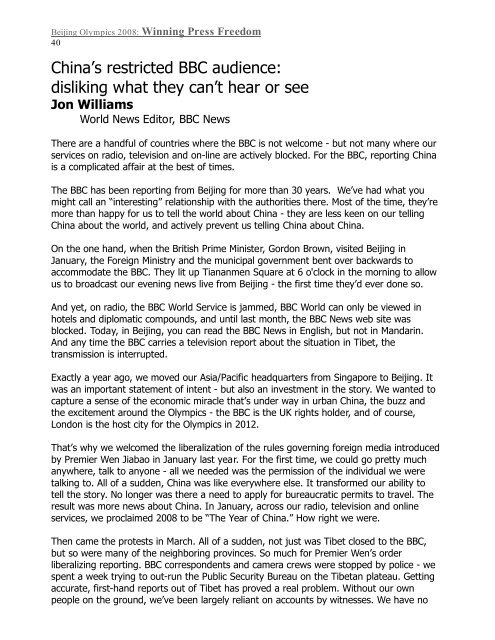Beijing Olympics 2008: Winning Press Freedom - World Press ...
Beijing Olympics 2008: Winning Press Freedom - World Press ...
Beijing Olympics 2008: Winning Press Freedom - World Press ...
You also want an ePaper? Increase the reach of your titles
YUMPU automatically turns print PDFs into web optimized ePapers that Google loves.
<strong>Beijing</strong> <strong>Olympics</strong> <strong>2008</strong>: <strong>Winning</strong> <strong>Press</strong> <strong>Freedom</strong><br />
40<br />
China’s restricted BBC audience:<br />
disliking what they can’t hear or see<br />
Jon Williams<br />
<strong>World</strong> News Editor, BBC News<br />
There are a handful of countries where the BBC is not welcome - but not many where our<br />
services on radio, television and on-line are actively blocked. For the BBC, reporting China<br />
is a complicated affair at the best of times.<br />
The BBC has been reporting from <strong>Beijing</strong> for more than 30 years. We’ve had what you<br />
might call an “interesting” relationship with the authorities there. Most of the time, they’re<br />
more than happy for us to tell the world about China - they are less keen on our telling<br />
China about the world, and actively prevent us telling China about China.<br />
On the one hand, when the British Prime Minister, Gordon Brown, visited <strong>Beijing</strong> in<br />
January, the Foreign Ministry and the municipal government bent over backwards to<br />
accommodate the BBC. They lit up Tiananmen Square at 6 o'clock in the morning to allow<br />
us to broadcast our evening news live from <strong>Beijing</strong> - the first time they’d ever done so.<br />
And yet, on radio, the BBC <strong>World</strong> Service is jammed, BBC <strong>World</strong> can only be viewed in<br />
hotels and diplomatic compounds, and until last month, the BBC News web site was<br />
blocked. Today, in <strong>Beijing</strong>, you can read the BBC News in English, but not in Mandarin.<br />
And any time the BBC carries a television report about the situation in Tibet, the<br />
transmission is interrupted.<br />
Exactly a year ago, we moved our Asia/Pacific headquarters from Singapore to <strong>Beijing</strong>. It<br />
was an important statement of intent - but also an investment in the story. We wanted to<br />
capture a sense of the economic miracle that’s under way in urban China, the buzz and<br />
the excitement around the <strong>Olympics</strong> - the BBC is the UK rights holder, and of course,<br />
London is the host city for the <strong>Olympics</strong> in 2012.<br />
That’s why we welcomed the liberalization of the rules governing foreign media introduced<br />
by Premier Wen Jiabao in January last year. For the first time, we could go pretty much<br />
anywhere, talk to anyone - all we needed was the permission of the individual we were<br />
talking to. All of a sudden, China was like everywhere else. It transformed our ability to<br />
tell the story. No longer was there a need to apply for bureaucratic permits to travel. The<br />
result was more news about China. In January, across our radio, television and online<br />
services, we proclaimed <strong>2008</strong> to be “The Year of China.” How right we were.<br />
Then came the protests in March. All of a sudden, not just was Tibet closed to the BBC,<br />
but so were many of the neighboring provinces. So much for Premier Wen’s order<br />
liberalizing reporting. BBC correspondents and camera crews were stopped by police - we<br />
spent a week trying to out-run the Public Security Bureau on the Tibetan plateau. Getting<br />
accurate, first-hand reports out of Tibet has proved a real problem. Without our own<br />
people on the ground, we’ve been largely reliant on accounts by witnesses. We have no





